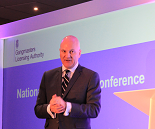GLA Conference 2016 - the highlights
10th March 2016
Passing the new Immigration Bill to expand the role and remit of the GLA will be ‘the easy part’ as the UK steps up its fight against modern slavery.
That was the message delivered to delegates at the GLA’s National Conference this week by the Head of the Home Office’s Modern Slavery Unit, Offer Stern-Weiner (pictured).
Delivering the opening keynote address to the sell-out event at Derby County’s iPro Stadium, he said: “I want to commend the GLA because they have continued to innovate … looking at doing things better, going faster.
“The results of a public consultation showed the industry thinks they are doing a great job. Businesses told us they get a lot out of the arrangement with the GLA but they also said they should do more.”
He added that these views had resulted in proposals contained the new Immigration Bill, which is in its final stages of passage through Parliament and will be back for debate in the House of Lords on Tuesday. (15 March)
The new bill’s provisions include extending the GLA’s remit and powers, expanding the organisation and changing its name to the Gangmasters and Labour Abuse Authority (GLAA).
If passed, the legislation will also create a new post of Director of Labour Market Enforcement to provide strategic direction for the GLA, the National Minimum Wage Unit and the Employment Agency Standards Inspectorate.
Added Mr Stern-Weiner: “Passing legislation is actually the easy bit. If it were all about legislation then slavery would have died off with Wilberforce. It is possible to make this happen but it takes a special effort from quite special people.”




Conference images: Offer Stern-Weiner, Paul Broadbent, Margaret Beels and Kevin McCormick
Also speaking on the changes that look likely to result from the new bill, GLA Chair Margaret Beels said she anticipated seeing the new powers going live in the Autumn and that the first strategy from the new director would be published by April 2017.
Mrs Beels added “We recognise it [the Bill] is trying to tackle a serious issue and trying to do it with a sense of urgency.”
She said creating a new agency from scratch would have taken at least two years and welcomed the new ideas the bill contained – including new enforcement orders for non-compliant businesses. But she added that this would only be possible with additional resources from the Government.
Recounting the negotiations held to draw up the bill she told delegates: “I think it was important we held a strong line on maintaining our licensing role and while we do not know yet how ‘dial-up/dial-down’ licensing is going work, it is an interesting idea and retains flexibility.
“The new arrangements represent a huge challenge for the GLA as it moves forwards but we want to step up to the opportunity to protect vulnerable workers in partnership with you.”
In closing the conference GLA Chief Executive Paul Broadbent echoed the Chair’s views and said he hoped the GLAA would take shape later this year.
He said: “We will always review what we do to ease the burden on the compliant and make the industry we regulate a hostile place for criminals, who we will relentlessly pursue.
“But we will never prosecute our way out of this problem, which is why we believe licensing is necessary to prevent crimes from happening in the first place.”
Earlier, keynote speaker, Independent Anti-Slavery Commissioner Kevin Hyland OBE, delivered an overview of the UK’s position a year on from the introduction of the Modern Slavery Act.
He also backed the proposals set out in the new Immigration Bill and said: “The changes that will be made from GLA to the GLAA further highlight the UK’s efforts to stamp out Modern Slavery.
“Proposals to give the GLA additional powers show the Government’s recognition of the gravity of the crime of labour exploitation and drives the point home that labour exploitation is a criminal malpractice.”



A selection of feedback from social media
Managing Director of KHS Personnel Ltd, Kevin McCormick, also spoke and told how he had been convinced over time of the value of the work of the GLA, changing him from ‘early sceptic to staunch supporter’.
He recalled his first-hand experience of when the GLA approached him with allegations about a ‘trusted supervisor’ he employed who had been mistreating fellow workers.
He said that being caught out had made the company ask themselves, and find the answers to, a number of questions: “How could we let this happen? How can we prevent it from happening again? What steps and processes could be put in place to prevent it from happening again?”
He added that by working closely with the GLA his business had learned how to recognise potential victims of exploitation.
Other speakers were Det Chief Superintendent Russ Jackson, who gave a passionate presentation about how he was heading up the efforts to tackle human trafficking and modern slavery with Greater Manchester Police, while West Yorkshire Police detectives Det Insp Andy Leonard and Det Sgt Paul Simm who recounted details of a recent case that hit the national headlines about a mattress manufacturer in Dewsbury.
DS Simm recalled the shocking conditions endured by the workers: “In one case we found 45 people living in a three-bedroomed house with one toilet and one shower. You can imagine the state and the smell of the place!”
In another case study, GLA Senior Investigating Officer Tony Byrne walked delegates through an investigation that resulted in the imprisonment of a Humberside couple who fraudulently established and ran an employment agency.
He explained how the GLA had been forced to call on a vast range of tactics to compile the case against CV Staff Services Ltd and how everyone involved in securing the convictions had been commended by the presiding judge.
The prosecuting barrister from the case, Andy Peet, added: “Compliance is an important function of the GLA but they are moving more and more and quickly towards enforcement.
“So make no mistake, and … not wishing to quote the famous line from the Liam Neeson film but … if a line is crossed the GLA will come after you, they will find you and they will convict you.”


